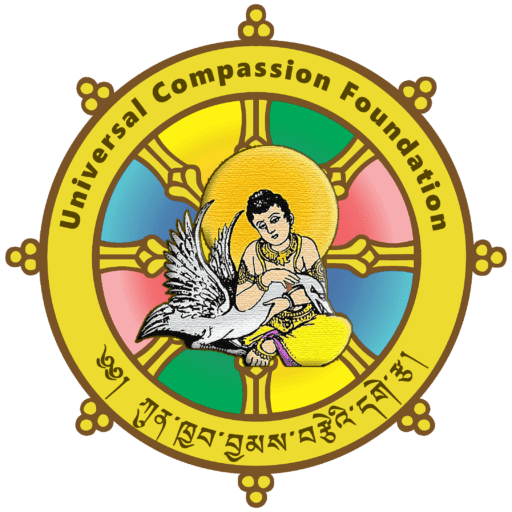Universal Compassion Foundation
Second Newsletter 2018
Table of Contents:
News- Trip to India
Past Events
Courses
Essence of recent teachings
Coming events
Hello Dharma brothers and sisters, Tashi Delek! Welcome back to our second quarterly Universal Compassion Foundation (UCF) and Buddhist Institute of Universal Compassion Newsletter. The past three months have flown by and Spring has finally arrived in Spokane.
Venerable Geshe Phelgye has been gone to India for several important tasks after spending six years in Spokane. However, we have been able to receive his teachings via Skype over our new projector system. We are very grateful for the gracious donation from one of our sangha members for the new equipment.
Here is a brief update; we hope you enjoy this newsletter as much as we have enjoyed putting it together for you.
Venerable Geshe Phelgye’s Trip to India
On March 20th, Geshe-la left for a trip to India after spending six years of his precious time with us. This trip was made for several important reasons, all of which are, discussed in more detail below.
1. Geshe-la’s first goal was to visit his only living teacher H.H. the Dalai Lama and brief him about his activities in the west since he left the Parliament in 2011. However, Geshe-la felt hesitant to ask for His Holiness’s precious time, considering his busy schedule at his current age. Nevertheless, Geshe-la got a tentative appointment with H.H. the Dalai Lama on very short notice, for which he went to Dharamsala on Sunday May 6 from Delhi in a night bus that took 11 hours.
He got a confirmed appointment on Wednesday morning at 9 AM, during which he was able to report about his service in the west during the last 7 years. (H.H. said in greeting, “My friend, where are you now?” When Geshe-la briefed him, H.H. was immensely pleased and told his secretary to bring a Buddha statue as a gift for him and said, “My prayers and blessings be always with you in your endeavors.”
Geshe-la had made a big photo thanka of H.H. for the Buddhist Institute of Universal Compassion, and H.H. blessed it with his signature. Geshe-la then rushed back to Delhi in an ordinary government bus in order to make to his flight at 6 am from Delhi to Bengaluru; he had to change several buses on the way to Delhi and reached there late at night.
[metaslider id=707]
[metaslider id=”727”]
- Another goal was to make a prayer offering to the monasteries for his departed parents and sister and, of course, for all beings. Geshe-la made a lunch feast with 100 Rs for each monk in the entire monastery as well as sponsoring a prayer ceremony dedicated to his late parents and sister, together with all sentient beings.
[metaslider id=”729″]
- Geshe-la’s final goal was to acquire a great Buddha statue, sutras, and other Bodhisattva statues, as well as thankas and other temple necessities for our Institute. He stayed at the home that he built in 1987, located inside the Sera-Jey Monastery, with his brother and students, working on the various projects at the local Tibetan refugee settlement. It was important to supervise all the ordered items in progress, making sure everything was finished to his satisfaction and on time. It was extremely hot during April and May in south India, so Geshe-la was dealing with mosquitos at night without air conditioning in the monastery. Geshe-la bought a big bronze Buddha statue, a custom-made statue of Nagarjuna (150-250 AD), the head of the great Nalanda university, and other statues like Padma- sambhava, Tsongkapa, Amitabha, Medicine Buddha, Vajrasattva, Tara and Avaloketeshvara, etc., all ordered from Nepal and painted in real gold.
[metaslider id=”731″]
UCF Past Events
In March, we celebrated the Great Prayer Festival on the auspicious full moon day of the 1st month of Tibetan lunar calendar. The Annual Prayer Festival was started 1409 AD by the great Tsongkhapa to mark the historic event of Buddha Shakyamuni overpowering the ascetics of his time. Upon repeated challenges made by the jealous ascetics for a spiritual power contest betting conversion of the faith of the loser to the winner. Buddha accepted the challenge and exercised unimaginable miraculous powers which completely defeated ascetics and converted all of them to Buddhist path.
[metaslider id=”733″]
Courses
Geshe-la recently gave an Introduction to Buddhism for Beginners at the request of some newcomers at the Buddhist Institute of Universal Compassion. The four-session course covered the basics from the Four Noble Truths and the Three Jewels through rational explanation. There were a lot of great questions and discussion that satisfied the newcomers who had joined the sangha since the course began.
Essence of recent teachings: February 11, 2018Â Â Â Â Â Â Â Â Â Â Â Â Â Â Â Â Â Â Â Â Â Â Â Â Â Â Â Â Â Â Â Â Â Â Â Â Â Â Â Â Â Â Â Â Â Â Â Â Â Â Â Â Â Â Â Â Â Â Â Â Â Â Â Â
Journaled by Malia Yangzom
On the Mahayana path, when trying to achieve or cultivate bodhicitta, there are two key things: the goal and the purpose. The goal is to achieve Buddha-hood, the state of omniscience, and the purpose is to help all suffering sentient beings. This is a huge task, but it is not impossible. As Buddhist ourselves on this path, particularly in the Mahayana tradition, our main focus is trying to transform ourselves towards the path of the Bodhisattva, and the only way to do that is to develop a genuine compassion and wisdom.
However, to develop such a compassion towards all beings is not that simple for us with our selfish attitudes. It takes really feeling the suffering of others, to feel the suffering of the other realms; there’s unthinkable sufferings out there. Once you start feeling for the big picture, personal issues become very small. The truth is that it is unbearable to witness anybody in pain, and this shows our natural seed of compassion within. We just have to cultivate that seed further.
February 25, 2018
We must look within ourselves to see where we are cultivating bodhicitta. What areas do we need to pay more attention to? Where are we lacking in that process? Do not hesitate to ask questions. An important note; when developing compassion and bodhicitta, sentient beings are not less important than Buddha himself. Â Buddha shows us the path, but sentient beings are the ones with which we practice our compassion and develop the precious bodhicitta. That’s how we achieve this special experience, the special realization of bodhicitta.
We have two ways of achieving bodhicitta; the first is Atisha’s way of taking six steps and then getting to bodhicitta, seven cause and effect steps that results in bodhicitta. The other way is through Shantideva’s practice of exchanging yourself and others. Either way, the only way to achieve this state is with other sentient beings. Our goal is to look at the most suffering sentient beings. Â Ask, “how can I ease their sufferings?” You may not experience a strong and moving compassion each time you sit, read or go for a teaching, but there are times you can experience powerful realizations and that’s how transformation begins. Otherwise, if learning the Dharma just goes on as academic information, you may have lot of information but no transformation will occur; a pursuit of only knowledge may cause your attitude and ego to grow stronger, and that’s like turning medicine into poison. The purpose of Dharma practice is to subdue our ego and arrogance, and turn that into humility and compassion.
As a Buddhist practitioner, we carry all these wonderful goals in our path, but do not forget, the path and practice begins from renunciation. And renunciation can only occur when you realize the suffering of life and samsara. Without a strong renunciation, even Nirvana, the cessation, is not possible, so work on renunciation first.
March 4, 2018
The first step on Buddha’s path is renunciation; this is why Buddha taught about the Four Noble Truths, introducing suffering and its causes. Achieving renunciation depends on meeting the true Dharma,-the teaching of Buddha.
What happens to us after we die? Are we like a candle flame that ends when the wind blows it out? It’s important to realize that our journey continues. That is the difference between a simple form and a sentient being. Your soul reincarnates into a different life, depending on your karma. That is the cycle of death and birth–we go into different realms based on the karma we create. That is why we need to renounce mundane pleasure distractions as much as we can and seek liberation for a lasting happiness.
People pursue mundane pleasures for the time being but anxiety and dissatisfaction remains; therefore, so long as you are experiencing some level of suffering, that means you still have work to do.
If you are inspired to learn, be serious, think critically to yourself, and try to live what we’ve learned–that is the practice. There’s no limit to learning, practicing and meditating until you achieve Buddhahood. The important thing to realize is that it is doable. Once you realize that, you develop a true enthusiasm for the path.
March 11, 2018
Today Geshe-la asked us why Buddha Shakyamuni (who was at the time a Bodhisattva) took the hardship of an extreme ascetic practice and sat under the Bodhi tree for six years, eating only a grain of rice per day? Geshe-la also asked us to look within to see what are we missing from our practice if we are not making the transformation we desire? Why do we remain unhappy, inpatient? We often don’t recognize how selfish or self-centered we truly are. Our ego is the main poison that makes us impatient, intolerant, and vulnerable, and ego comes from our fundamental ignorance. Because of ego, we become very protective and defensive of ourselves. For example, if you run in to a life threatening robbery, you will give away everything to spare your life. That is the amount of attachment we have with our life, and our body is what holds this life. That is why we carry so much fear and attachment, and that is the fundamental thing that is holding us in samsara. Buddha, in taking ascetic hardships, fighting against that attachment, achieved victory over samsara.
Yes, there are many challenges in our life, many challenges on our path, but if you really trace suffering down to the root, it stems from attachment, and that is due to our fundamental ignorance. Due to that ignorance, we carry too much ego. Therefore you have to recognize this ego; the ego is your worst enemy. (ego here referring to self-importance)
It is important to recognize the difference between your ego and your self-confidence. The ego arises from ignorance, and self-confidence arises from the Buddha nature-your pure nature, the potential.
March 18, 2018
As you learn, your reliance, your trust in the Buddha’s teaching grows deeper and deeper, and that is what we call awakening faith. However, if faith is not supported by rational understanding and wisdom, that is called blind faith. That kind of faith can be shaken at any time by a good storyteller. Furthermore, blind faith can cause big problems as well.
Buddha Shakyamuni worked hard and sacrificed all his self-concerns for all sentient beings. His purpose was what he achieved: enlightenment. That enlightenment brought the true teaching, “the Dharma,” that is why Buddha is precious to us. He is the first refuge. However, we were not fortunate enough to hear from Buddha himself when he came to the world. We have a human life right now, and we get the same Dharma teachings from our Guru. Our Guru is playing the same role as Buddha did during his lifetime. That is why the root of the gradual path to enlightenment called “Lam Rim” is Guru Devotion.
April 8, 2018
In the Four Noble Truths, Buddha talked about the importance of understanding suffering, the causes of suffering, the possibility of liberation from the suffering, the possibility of Nirvana and the path: the way to Nirvana, the method, the Dharma. Suffering comes about from causes and conditions that we have accumulated in the past due to our ignorance, attachment and aversion. Both attachment and aversion stem from ignorance. Ignorance blinds us from seeing the truth.
The term Dharma is translated in Tibetan as “Cho,” Cho meaning transformation or change, changing ourselves from negative to positive, changing our ignorance to insight and wisdom, that brings us to cessation. However, in the Mahayana tradition, our ultimate goal is to achieve Buddhahood, the fully enlightened state, so we can help infinite sentient beings. When you genuinely think about the wellbeing of all sentient beings, selfish-concern and its anxiety disappears.
April 15, 2018
The Noble Eightfold Path consists of: right view, right intention, right speech, right action, right livelihood, right effort, right mindfulness and right concentration. “Right“ here means righteousness, virtue, the extraordinary eightfold path. The “Eightfold Righteous Path” would be the correct translation, Righteousness meaning the quality of being morally right or justifiable.
April 22, 2018
How do we evaluate what is right view from the concept of righteousness? If our thoughts and actions, or our view, are righteous or not? The scriptural definition of right view reads: “discerning the meaning of the Four Noble Truths through proper analytical and contemplative means.” There are two sets of causes and conditions in the Four Noble Truths. One set is negative, that is suffering and it’s causes. The other set is from the positive, cessation and the path to cessation. That karma of causality, the practice of virtues and non-virtues, very much depends on our intention.
In the beginning of the Dhammapada, Buddha says, “the mind is everything,” which means our intention, our motivation, is the key thing. Sometimes in spite of an absolutely compassionate intention, an action may not seem compassionate. In ancient monastic culture, the teachers, the discipliners, even the seniors, would punish you with whips if you broke rules or didn’t study or practice the way you were supposed to, but their intention was to train you to be a better person, that is, acting out of love and care. Â Another example might be putting your small child in the corner and not speaking with them for a period of time to help them learn a lesson.
Real abuse comes out of hatred, not out of love and care. Abuse isn’t just physical and verbal–if you’re angry with someone and do not speak with them for a period of time, that pain is mental abuse. There are various levels and types of abuse: physical, verbal and mental. The pain from a physical blow will go away quickly; however, the hit from a strong word, a verbal hit, doesn’t go away so easy.
News updates:
Spring is winding down and the Universal Compassion Foundation is gearing up for Summer. We are excited to announce that we will be participating in more community activities as a Sangha beginning with a monthly neighborhood trash pickup day on the first Sunday of every month. There will be a potluck and Sangha meeting afterwards. Starting next month, bring your walking shoes and a smile as we put our generosity into action by making our Temple’s neighborhood a cleaner place.
Buddhist Institute of Universal Compassion Foundation is holding snack drives for our homeless brothers and sisters in Spokane. Please bring some snacks, like fruits, protein bars and water bottles to hand out in the long hot days of summer. Snacks are said to be life saver on the streets and this is something small we can do as a Sangha to help. The snack box is located next to the email signup sheet in the Temple hall.
Sangha Movie Night
We will be holding a movie night at the Buddhist Institute of Universal Compassion on the last Friday of each month starting at 7:00pm. Come enjoy some inspiring movies, eat popcorn, meet with good people in your Sangha family. We will post the movie title ahead of each movie-night.
Sangha Family Picnic
Save the Date!
We will be hosting our Second Annual Yard Sale on July 20-21st. If you have items that you wish to donate, please bring them the Temple and place them downstairs. We are also looking for volunteers to help in this endeavor, therefore if you are inspired, please inform Geshe-la, Zangmo or Yangzom. Remember temple work is Dharma practice and Dharma is for all beings.
Universal Compassion Foundation Animal blessing
Save the date! Geshe-la is going to resume his animal blessing program this year on Saturday August 11 at 10 AM here at Buddhist Institute of Universal Compassion lawn. Geshe-la will confer a special blessing ceremony and bless each animal for their health and future spiritual journey. If you truly love your animal, do not miss this rare opportunity.
Sunday Teaching
By the way, this Sunday Geshe-la will be reviewing on the very important Buddhist teaching of Noble Eightfold Path. Please bring your notepad and pen as the saying goes, “a dull pencil is better than a sharp memory.” We hope to see you all there.
All events and services at the Universal compassion foundation are offered for free, however any support or donation for the causes will be deeply appreciated with honor. Drop a check or dollar in person or go online www.universalcompassion.org
Journaled by Thupten Yangzom-Malia Woods                                         Edited by Thupten Zangmo-Carrie Bucher
Universal Compassion Foundation/Buddhist Institute of Universal Compassion
728 E. Rich Ave, Spokane, WA 99207
(509) 474-1876
info@universalcompassion.org
www.universalcompassion.org






